中考英语语法知识复习学案(动词的时态和语态)
文档属性
| 名称 | 中考英语语法知识复习学案(动词的时态和语态) | 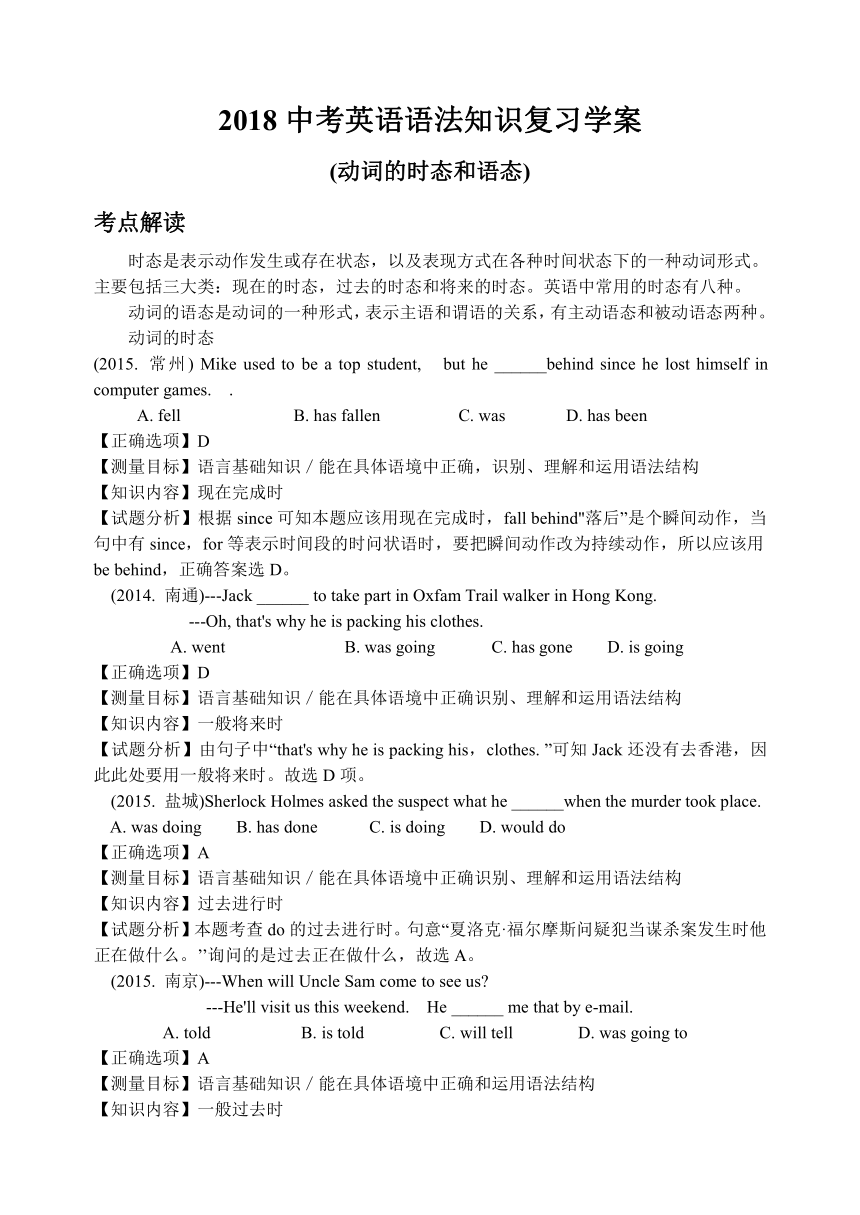 | |
| 格式 | zip | ||
| 文件大小 | 120.5KB | ||
| 资源类型 | 教案 | ||
| 版本资源 | 牛津译林版 | ||
| 科目 | 英语 | ||
| 更新时间 | 2018-10-29 19:33:47 | ||
图片预览

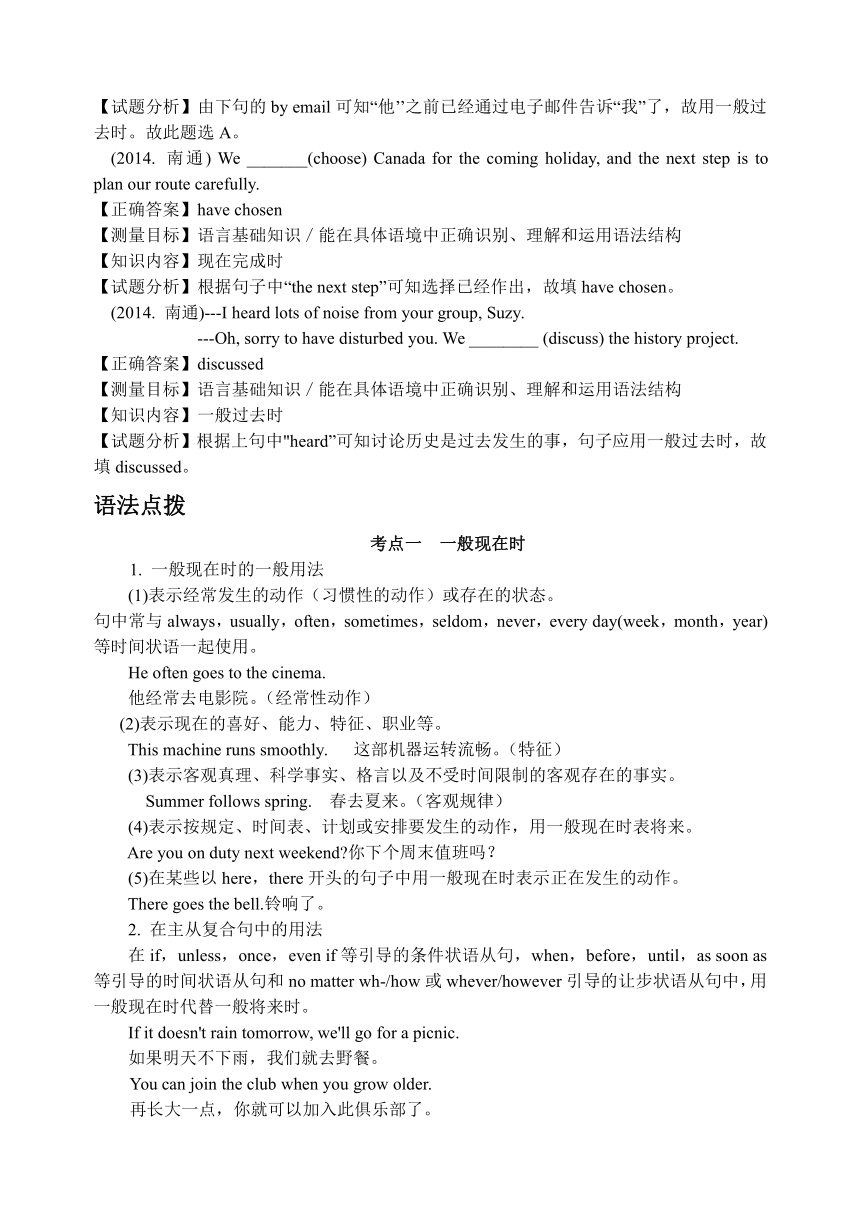
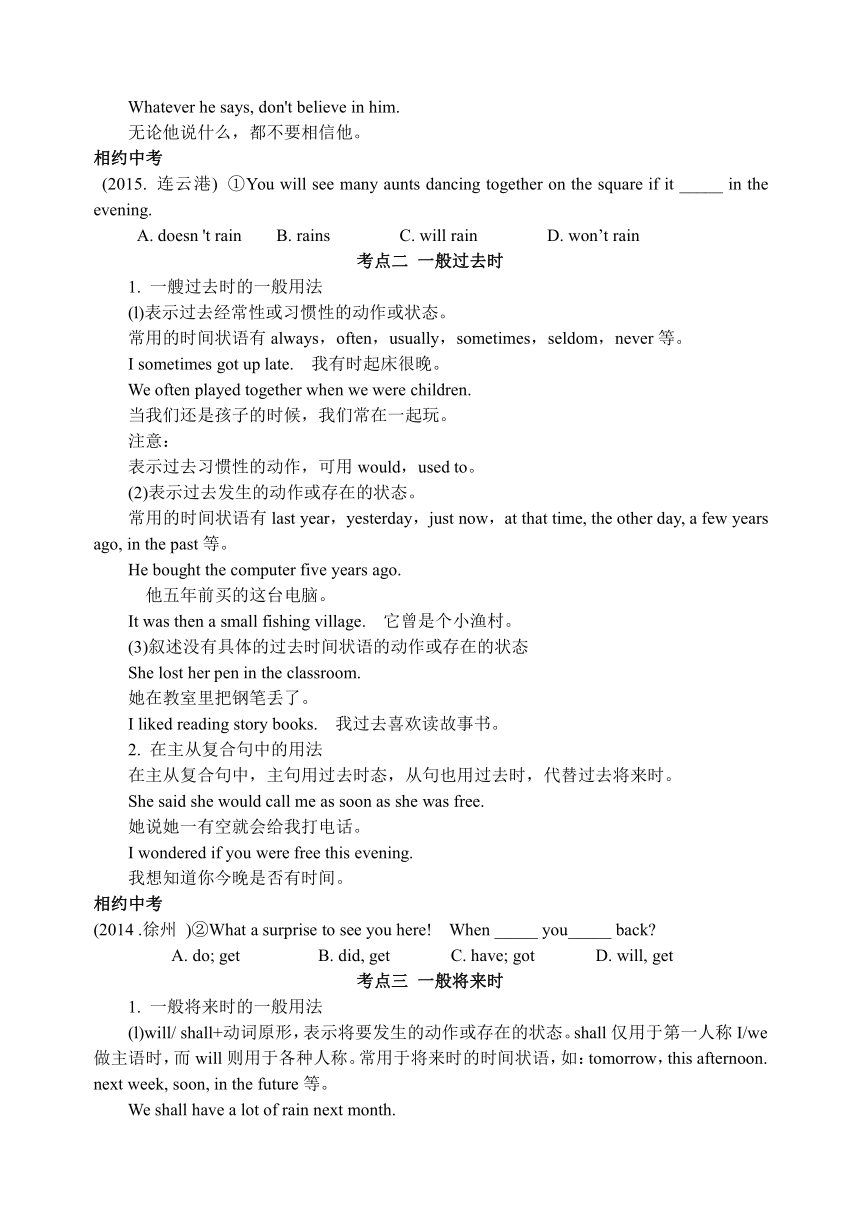
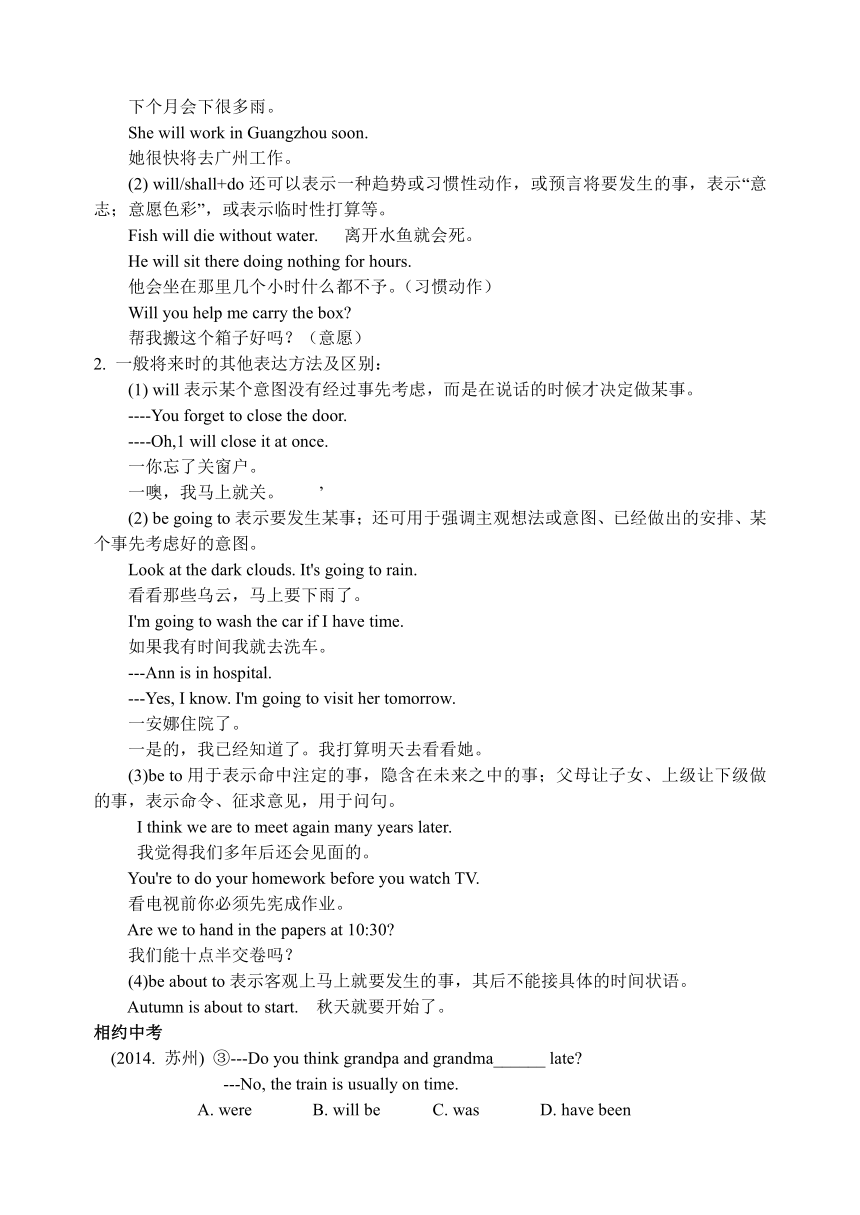
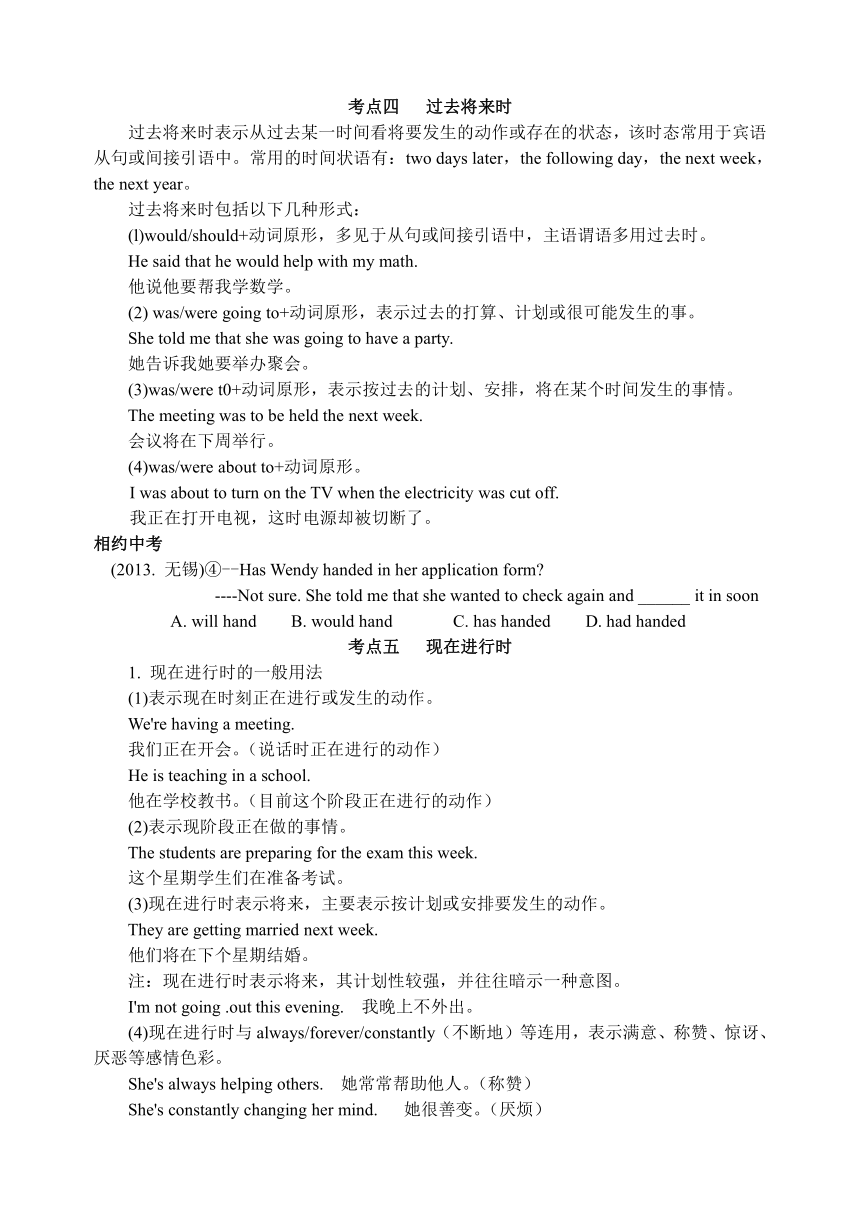
文档简介
2018中考英语语法知识复习学案
(动词的时态和语态)
考点解读
时态是表示动作发生或存在状态,以及表现方式在各种时间状态下的一种动词形式。主要包括三大类:现在的时态,过去的时态和将来的时态。英语中常用的时态有八种。
动词的语态是动词的一种形式,表示主语和谓语的关系,有主动语态和被动语态两种。
动词的时态
(2015. 常州) Mike used to be a top student, but he ______behind since he lost himself in computer games. .
A. fell B. has fallen C. was D. has been
【正确选项】D
【测量目标】语言基础知识/能在具体语境中正确,识别、理解和运用语法结构
【知识内容】现在完成时
【试题分析】根据since可知本题应该用现在完成时,fall behind"落后”是个瞬间动作,当句中有since,for等表示时间段的时问状语时,要把瞬间动作改为持续动作,所以应该用be behind,正确答案选D。
(2014. 南通)---Jack ______ to take part in Oxfam Trail walker in Hong Kong.
---Oh, that's why he is packing his clothes.
A. went B. was going C. has gone D. is going
【正确选项】D
【测量目标】语言基础知识/能在具体语境中正确识别、理解和运用语法结构
【知识内容】一般将来时
【试题分析】由句子中“that's why he is packing his,clothes. ”可知Jack还没有去香港,因此此处要用一般将来时。故选D项。
(2015. 盐城)Sherlock Holmes asked the suspect what he ______when the murder took place.
A. was doing B. has done C. is doing D. would do
【正确选项】A
【测量目标】语言基础知识/能在具体语境中正确识别、理解和运用语法结构
【知识内容】过去进行时
【试题分析】本题考查do的过去进行时。句意“夏洛克·福尔摩斯问疑犯当谋杀案发生时他正在做什么。’’询问的是过去正在做什么,故选A。
(2015. 南京)---When will Uncle Sam come to see us?
---He'll visit us this weekend. He ______ me that by e-mail.
A. told B. is told C. will tell D. was going to
【正确选项】A
【测量目标】语言基础知识/能在具体语境中正确和运用语法结构
【知识内容】一般过去时
【试题分析】由下句的by email可知“他’’之前已经通过电子邮件告诉“我”了,故用一般过去时。故此题选A。
(2014. 南通) We _______(choose) Canada for the coming holiday, and the next step is to plan our route carefully.
【正确答案】have chosen
【测量目标】语言基础知识/能在具体语境中正确识别、理解和运用语法结构
【知识内容】现在完成时
【试题分析】根据句子中“the next step”可知选择已经作出,故填have chosen。
(2014. 南通)---I heard lots of noise from your group, Suzy.
---Oh, sorry to have disturbed you. We ________ (discuss) the history project.
【正确答案】discussed
【测量目标】语言基础知识/能在具体语境中正确识别、理解和运用语法结构
【知识内容】一般过去时
【试题分析】根据上句中"heard”可知讨论历史是过去发生的事,句子应用一般过去时,故填discussed。
语法点拨
考点一 一般现在时
1. 一般现在时的一般用法
(1)表示经常发生的动作(习惯性的动作)或存在的状态。
句中常与always,usually,often,sometimes,seldom,never,every day(week,month,year)等时间状语一起使用。
He often goes to the cinema.
他经常去电影院。(经常性动作)
(2)表示现在的喜好、能力、特征、职业等。
This machine runs smoothly. 这部机器运转流畅。(特征)
(3)表示客观真理、科学事实、格言以及不受时间限制的客观存在的事实。
Summer follows spring. 春去夏来。(客观规律)
(4)表示按规定、时间表、计划或安排要发生的动作,用一般现在时表将来。
Are you on duty next weekend?你下个周末值班吗?
(5)在某些以here,there开头的句子中用一般现在时表示正在发生的动作。
There goes the bell.铃响了。
2. 在主从复合句中的用法
在if,unless,once,even if等引导的条件状语从句,when,before,until,as soon as等引导的时间状语从句和no matter wh-/how或whever/however引导的让步状语从句中,用一般现在时代替一般将来时。
If it doesn't rain tomorrow, we'll go for a picnic.
如果明天不下雨,我们就去野餐。
You can join the club when you grow older.
再长大一点,你就可以加入此俱乐部了。
Whatever he says, don't believe in him.
无论他说什么,都不要相信他。
相约中考
(2015. 连云港) ①You will see many aunts dancing together on the square if it _____ in the evening.
A. doesn 't rain B. rains C. will rain D. won’t rain
考点二 一般过去时
1. 一艘过去时的一般用法
(l)表示过去经常性或习惯性的动作或状态。
常用的时间状语有always,often,usually,sometimes,seldom,never等。
I sometimes got up late. 我有时起床很晚。
We often played together when we were children.
当我们还是孩子的时候,我们常在一起玩。
注意:
表示过去习惯性的动作,可用would,used to。
(2)表示过去发生的动作或存在的状态。
常用的时间状语有last year,yesterday,just now,at that time, the other day, a few years ago, in the past等。
He bought the computer five years ago.
他五年前买的这台电脑。
It was then a small fishing village. 它曾是个小渔村。
(3)叙述没有具体的过去时间状语的动作或存在的状态
She lost her pen in the classroom.
她在教室里把钢笔丢了。
I liked reading story books. 我过去喜欢读故事书。
2. 在主从复合句中的用法
在主从复合句中,主句用过去时态,从句也用过去时,代替过去将来时。
She said she would call me as soon as she was free.
她说她一有空就会给我打电话。
I wondered if you were free this evening.
我想知道你今晚是否有时间。
相约中考
(2014 .徐州 )②What a surprise to see you here! When _____ you_____ back?
A. do; get B. did, get C. have; got D. will, get
考点三 一般将来时
1. 一般将来时的一般用法
(l)will/ shall+动词原形,表示将要发生的动作或存在的状态。shall仅用于第一人称I/we做主语时,而will则用于各种人称。常用于将来时的时间状语,如:tomorrow,this afternoon. next week, soon, in the future等。
We shall have a lot of rain next month.
下个月会下很多雨。
She will work in Guangzhou soon.
她很快将去广州工作。
(2) will/shall+do还可以表示一种趋势或习惯性动作,或预言将要发生的事,表示“意志;意愿色彩”,或表示临时性打算等。
Fish will die without water. 离开水鱼就会死。
He will sit there doing nothing for hours.
他会坐在那里几个小时什么都不予。(习惯动作)
Will you help me carry the box?
帮我搬这个箱子好吗?(意愿)
2. 一般将来时的其他表达方法及区别:
(1) will表示某个意图没有经过事先考虑,而是在说话的时候才决定做某事。
----You forget to close the door.
----Oh,1 will close it at once.
一你忘了关窗户。
一噢,我马上就关。 ’
(2) be going to表示要发生某事;还可用于强调主观想法或意图、已经做出的安排、某个事先考虑好的意图。
Look at the dark clouds. It's going to rain.
看看那些乌云,马上要下雨了。
I'm going to wash the car if I have time.
如果我有时间我就去洗车。
---Ann is in hospital.
---Yes, I know. I'm going to visit her tomorrow.
一安娜住院了。
一是的,我已经知道了。我打算明天去看看她。
(3)be to用于表示命中注定的事,隐含在未来之中的事;父母让子女、上级让下级做的事,表示命令、征求意见,用于问句。
I think we are to meet again many years later.
我觉得我们多年后还会见面的。
You're to do your homework before you watch TV.
看电视前你必须先宪成作业。
Are we to hand in the papers at 10:30?
我们能十点半交卷吗?
(4)be about to表示客观上马上就要发生的事,其后不能接具体的时间状语。
Autumn is about to start. 秋天就要开始了。
相约中考
(2014. 苏州) ③---Do you think grandpa and grandma______ late?
---No, the train is usually on time.
A. were B. will be C. was D. have been
考点四 过去将来时
过去将来时表示从过去某一时间看将要发生的动作或存在的状态,该时态常用于宾语从句或间接引语中。常用的时间状语有:two days later,the following day,the next week,the next year。
过去将来时包括以下几种形式:
(l)would/should+动词原形,多见于从句或间接引语中,主语谓语多用过去时。
He said that he would help with my math.
他说他要帮我学数学。
(2) was/were going to+动词原形,表示过去的打算、计划或很可能发生的事。
She told me that she was going to have a party.
她告诉我她要举办聚会。
(3)was/were t0+动词原形,表示按过去的计划、安排,将在某个时间发生的事情。
The meeting was to be held the next week.
会议将在下周举行。
(4)was/were about to+动词原形。
I was about to turn on the TV when the electricity was cut off.
我正在打开电视,这时电源却被切断了。
相约中考
(2013. 无锡)④--Has Wendy handed in her application form?
----Not sure. She told me that she wanted to check again and ______ it in soon
A. will hand B. would hand C. has handed D. had handed
考点五 现在进行时
1. 现在进行时的一般用法
(1)表示现在时刻正在进行或发生的动作。
We're having a meeting.
我们正在开会。(说话时正在进行的动作)
He is teaching in a school.
他在学校教书。(目前这个阶段正在进行的动作)
(2)表示现阶段正在做的事情。
The students are preparing for the exam this week.
这个星期学生们在准备考试。
(3)现在进行时表示将来,主要表示按计划或安排要发生的动作。
They are getting married next week.
他们将在下个星期结婚。
注:现在进行时表示将来,其计划性较强,并往往暗示一种意图。
I'm not going .out this evening. 我晚上不外出。
(4)现在进行时与always/forever/constantly(不断地)等连用,表示满意、称赞、惊讶、厌恶等感彩。
She's always helping others. 她常常帮助他人。(称赞)
She's constantly changing her mind. 她很善变。(厌烦)
2. 不用于进行时态的动词:
(1)表示心理活动的动词,如like,love,hate,know,realize, understand, remember, believe, hope, wish等。
She likes pop songs. 她喜欢流行歌曲。
(2)表示属于或拥有等动词,如belong to(属于),have等。
The book belongs to Ann. 这本书是安的。
She has two brothers. 她有两个哥哥。
(3)表示感官的连系动词,如seem, appear, look, sound, taste,smell等,但feel可用于进行时表示一时的感觉。
Your idea sounds good. 你的想法听起来很好。
I am not feeling well today. 我今天感觉不舒服。
(4)表示行为结果的动词,如accept, receive, allow, decide,promise等。
I accept your suggestions. 我接受你们的建议。
She decided to go home at once. 她决定马上回家。
相约中考
(2015. 扬州)⑤---You look worried. What's wrong?
---I went for a job interview yesterday and I ______ the result.
A. waited for B. was waiting for C. am waiting for D. will wait for
考点六 过去进行时
1. 过去进行时的一般用法
(1)表示过去某一时间正在进行的动作
What were you doing at eight last night?
咋天晚上8点你在做什么?
(2)表示过去某一段时间内正在进行的动作。
They were waiting for the boss all morning.
整个上午他们一直在等那个老板。
(3)表示一个动作发生时,另一个动作正在进行。
He was playing while l was studying.
我学习的时候,他在玩。
(4)表示从过去某一时间的角度看将要发生的动作,仅用于come to,go,start,leave,stay,arrive等非延续性动词。
She asked when we were leaving. 她问我们何时动身。
(5)过去进行时表示现在,主要使语气更委婉、客气。
I was wondering if you could give me a hand.
我想知道你能否帮我一个忙。
注:能这样用的动词主要限于want,wonder,think,hope,intend等少数动词。
考点七 现在完成时
1. 现在完成时的一般用法
(1)影响性用法:该用法表示一个过去发生的动作在过去已经完成,且对现在造成影响或导致结果。
He has left the city.
他已经离开了这个城市。(结果:他不在这个城市)
(2)持续性用法:该用法表示一个过去发生的动作,在过击并未完成,而是持续到现在,且可能继续持续下去或可能到此结束。
Have you waited long?’ 你等了很久吗?
2. 现在完成时在从句中的用法
在时间或条件状语从句中,现在完成时表示将来某个时间完成的动作。
Don't get off the bus until it has stopped.
等车完全停下后再下车。
I will help you when I have finished my work.
等我完成了工作就去帮助你。
相约中考
(2015. 泰州)⑥--Look at the blue sky! The rain __________ .
----Let's go out for a walk.
A. stops B. will stop C. has stopped D. had stopped
考点八 过去完成时
1. 过去完成时的一般用法
(1)表示一个过去动作或状态在某一时间活动之前已经完成或结束,即发生在“过去的过去”。
We had waited there when she arrived.
当她到达时,我们已等候在那里了。
By six o'clock he had worked twelve hours.
到六点的时候,他已经工作了十二个小时了。
注:只有和过去某时间或动作相比较时才能用到这一时态。常用的时间状语有. by the end of. by that time, before+过去时间或从句,when+从句。
(2)表示过去某一时间的某动作或状态持续到过去另一时间,还可能持续下去。
常用的时间状语有:since+过去时间点或从句,for+时间段。
He had worked for two years before he came here.
他来这之前已经工作了两年。
(3) hope,wish,want,think,expect,等用于过去完成时态,表示过去未曾实现的“计划、打算、愿望、想法”等,多译为“本想(本打算、本以为……)”。
The boy had hoped to win the first prize.
男孩本希望获得一等奖。
2. 一些特殊句型中的过去完成时:
(1)在“It was the first( second/third:,.) time+ that从句”或“It was the only +that从句”或“It was the+最高级…+that从句”从句中,谓语用过去完成时。
(2)by(the end of)+过去时间,句中谓语用过去完成时。
(3)by the time+-般过去式,主句中谓语用过去完成时。
(4) No sooner+ had+主语十过去分词+than+ 一般过去时;
(5) Hardly+ had+主语十过去分词+when+一般过去时。
动词的语态
题型事例
(2015.南京) Pukou Railway Station______ in 1911 and it has become a filming location for films and TV plays in recent years.
A. build. B. is built C. built D. was built
【正确选项】D
【知识内容】一般过去时的被动语态
【测量目标】语言基础知识/能在具体语境中正确识别、理解和运用语法结构
【试题分析】由后文的“and”一词可知这是个并列句,故“Pukou Railway Station _____in 1911”是个完整的句子。且由1911是明确的过去的时间可知此句应用过去时。故此题选D。
(2015. 盐城) ---Can Mr.King spare some time for the charity show?
---If he ____________,he will try his best to make it.
A. will be invited B. is invited C. invites D. invited
【正确选项】B
【测量目标】语言基础知识/能在具体语境中正确识别、理解和运用语法结构
【知识内容】一般现在时的被动语态
【试题分析】if引导条件状语从句,从句用一般现在时表示将来。is invited表示“被邀请”,用被动语态。故选B。
(2014. 徐州) The Second Youth Olympic Games _________ in Nanjing on the sixteenth of August, 2014.
A. will hold B. will be held C. was held D. is holding
【正确选项】B
【测量目标】语言基础知识/能在具体语境中正确识别、理解和运用语法结构
【知识内容】一般将来时的被动语态
【试题分析】根据题中“on the sixteenth of August,2014”可知,本题时态为一般将来时,又因为“The Second Youth Olympic Games”为hold的逻辑宾语,故此处应用被动语态,选B项。
语法点拨
考点一 被动语态
1. 被动语态的构成
(l)一般现在时的被动语态:
由“am/is/are+过去分词”构成。
English is taught in our school.我们学校教英语。
(2)一般过去时的被动语态:
由“was/were+过去分词”构成。
The books were written by Lu Xun.
这些书是鲁迅写的。
(3)一般将来时的被动语态:
由“shall/will be going to/be to be+过去分词”构成。shall用于第一人称,will用于各种人称。
The sports meeting will be held next week.
运动会将于下周举行。
(4)一般过去将来时的被动语态:
由“should/would be+过去分词”构成。
She said that she would be invited to the meeting.
她说她将被邀请去参加那个会议。
(5)现在进行时的被动语态:
由“am/is/are being+过去分词”构成。
New factories are being built in that area.
新的工厂正在那个地区建起来。
(6)过去进行时的被动语态:
由“was/were being+过去分词”构成。
The car was being repaired when we got there.
我们到达时汽车正在修理。
(7)现在完成时的被动语态:
由“have/has been+过去分词”构成。
The computer has been used for ten years.
这台电脑已经被用了十年了。
(8)过去完成时的被动语态:
由“had been+过去分词”构成。
The movie had been ended by the time you came.
你来时,电影就已经放完了。
2. 被动语态的用法
(1)不知道动作的执行者或虽然知道动作的执行者但没有必要说出时:
The books- are written for children.
这些书是为儿童编写的。
(2)当强调动作承受者,即把动作的承受者作为谈话的中心时,常用by引出动作的发出者:
This tower was built by Chinese.
这个塔是中国人建的。
(3)当动作的执行者是无生命名词时:
The windows were broken by winds.
这些窗户是被风刮坏的。
(4)出于礼貌不便提及动作执行者时:
The floor has been broken. 地板被弄坏了。
(5)某些习惯用法中:
He was born in Beijing in 1968.
他1968年出生在北京。
注;其他被动语态的习惯搭配有:be surprised by(对……感到惊讶),be determined to do“决心做”,be interested in“对……感兴趣”,be dressed in“穿着……”
相约中考
(2014. 南京) ⑦We're sure that the environment in our city _______greatly through our, work in the near future.
A. improved B. was improved C. has improved D. will be improved
考点二 被动语态的常用句式
(1)普通句式
①肯定句式:主语+be+过去分词十其他
The boy is often laughed at. 那个男孩常被嘲笑。
②否定句式:主语+be+not+过去分词十其他
The car is not made in China. 这汽车不是中国制造的。
③一般疑问句式. be+主语十过去分词十其他?
Are these shoes bought here? 鞋子是在这儿买的吗?
④特殊疑问句式:特殊疑问词(主语)+be+过去分词十其他?特殊疑问词+be+主语十过去分词十其他?
Who was invited at the party?谁被邀请参加聚会了?
When was the company founded?公司什么时候成立的?
(2)含情态动词的被动语态
①肯定句式:主语十情态动词+be+过去分词十其他
All the homework must be finished on time.
所有的作业必须按时宪成。
②否定句式:主语十情态动词+ be+ not+过去分词十其他
The room need not be cleaned. 这个房间不需要打扫。
③一般疑问句式:情态动词十主语+be+过去分词十其他?
Must the window be repaired now?窗户必须现在修吗?
④特殊疑问句式:特殊疑问词(主语)+情态动词+be+过去分词十其他?
特殊疑问词十情态动词十主语+be+过去分词十其他?
When can the books be bought?
什么时候可以买到那些书?
Who will be sent to Japan? 谁将被派往日本?
相约中考
(2015. 扬州)⑧---Did you and your sister go to Miss Brown's party yesterday?
---No. Neither of us ____________.
A. invites B. invited C. is invited D. was invited
考点三 主动形式表被动意义
1. 动词的主动形式表被动意义
(1)动词如break, catch, clean, drive, lock, open, sell,read,write,was等,它们作不及物动词来描述主语特征时,常用其主动形式表达被动意义,主语通常是物。
This kind of cloth washes well.
这种布料的衣服很耐洗。
注:主动语态表被动强调的是主语的特征,而被动语态则强调外界作用造成的影响。
(2)表示“发生、进行”的不及物动词和短语,如:happen,take place, break out, come out, come about, come true, run out,give out,turn out等以主动形式表示被动意义。
How do these newspapers come out?
这些报纸是如何印出来的呢?
(3)系动词没有被动形式,但有些表示感受、感官的连系动词feel,sound,taste,look,feel等系表结构中常以主动形式表示被动意义。
Your reason sounds reasonable.
你的理由听上去是合理的。
2. 非谓语动词的主动形式表被动意义
(1)在need,want,require,bear等词的后画,动名词用主动形式表示被动意义,其含义相当于动词不定式的被动形式。
The house needs repairing(to be repaired).
这房子需要修理。
(2)形容词worth后面跟动名词的主动形式表示被动含义,但不能跟动词不定式;而worth后面跟动词不定式的被动
形式。
The picture-book is well worth reading. =The picture book is very worth to be read.
这本图画书值得阅读。
(3)动词不定式在名词后面作定语,不定式和名词之间有动宾关系时,又和句中另一名词或词构成主谓关系,不定式的主动形式表示被动含义。
I have a lot of things to do this afternoon.
今天下午我有很多事要做。(to do与things是动宾关系,与I是主谓关系。)
I'II go to the post office Do you have a letter to be posted?
我要去邮局,你有信要寄吗?(此处用不定式的被动语态作定语表明you不是post动作的执行者。)
(4)在某些“形容词十不定式”做表语或宾语补足语的结构中,句子的主语或宾语又是动词不定式的逻辑宾话时,这时常用不定式的主动形式表达被动意义。这些形容词有nice,
easy. fit, hard, difficult, important, impossible, pleasant,interesting等。
This problem is difficult to work out. 这个问题很难解决。
(5)在too- to-结构中,不定式前面可加逻辑主语,所以应用主动形式表示被动意义。
This book is too expensive (for me)to buy.
这本书太贵了,我买不起。
(6)在there be…句型中,当动词不定式修饰名词作定语时,不定式用主动式作定语,重点在人;用被动形式作定语,重点在物。
There is no time to lose (to be lost). 没时间浪费了。
(7)在be to do结构中的一些不定式通常应用主动表主动,被动表被动。然而,由于古英语的影响,下列动词rent,blame,let等仍用不定式的主动形式表示被动意义。
Who is to blame for starting the fire?
谁该为这次火灾负责?
3. 介词in. on, under等十名词构成介词短语表被动意义
(1) "under+名词”结构,表示“某事在进行中”。常见的有:under control(受控制),under treatment(在治疗中). Under repair(在修理中),under discussion(在讨论中)。
(2)"beyond+名词”结构,“出乎……、胜过……”。常见的有. beyond belief(令人难以置信),beyond one's control(无法控制),beyond our hope(我们始料未及)。
(3)"above+名词”结构,表示“(品质、行为、能力等)超过……、高于……”。
His honest character is above all praise.
=His honest character cannot be praised enough.
他诚实的品质值得高度赞扬。
(4)“for+名词”结构,表示“适于……,为着……”。如:for sale(出售),for rent(出租)等。
That house is for sale. =That house is to be sold. .
这房子正在待售。
(5)“in+名词” 结构,表示“在……过程中或范围内”常见的有:in print(在印刷中),in sight(在视野范围内),等。
The book is not yet in print.
=The book is not yet printed.
这本书还没有印刷出来。
相约中考
( 2013. 无锡)⑨Don't throw away the waste paper. It needs _____ so that it can be reused.
A. to destroy B. destroying C. to collect D. collecting
易错防范
典例呈现一
( )The train Beijing at six and _______at Hang zhou at nine tomorrow.
. will leave; arrive B. will leave; will leave
C.. leaves; arrives D. leaved; arrived
【易错剖析】由于对本句的时态把握不准而误选B项。考生看到时间状语tomorrow,就会简单地认为,要用将来时。但事实上,本句是关于火车的出发和到达时间,是比较固定的将要发生的动作,应该用一般现在时表示将来,故选C项。
典例呈现二
( ) There _________ an interesting cartoon on CCTV-6 at 7:30 this evening.
A. is going to have B. is going to be C. will have D. will to be
【易错剖析】由于不了解there be句型的一般将来时易误选A或C项。本题考查there be句型的一般将来时,主语an interesting cartoon是单数,故用is going to be形式。
典例呈现三
( ) At last the boy was made _________ and began to laugh.
A. stop crying B. to stop cry C. to stop crying D. stop to cry
【答案】C
【易错剖析】由于make sb. do sth.误选A项。make,have,see,等动词在变为被动语态时要把省略的to补出来;stop todo“停下来去干……”;stop doing“停止做”;此处是说停止哭泣,故选C项。
典例呈现四
( )---What were you doing when the light went off?
一I _________________ with my roommates on the bed.
A. talk B. talked C. am talking D. was talking
【易错剖析】此处容易受到问句中一般过去时的影响,误选B项。表示过去某个过程中正在发生的动作应用过去进行时。故本题选D项。
巩固训练
一、词汇运用
用动词的适当形式填空
1. The moon _____________ (run) around the earth. .
2. He usually___________(go) to see his parents once a month last year.
3. My brother ___________ (graduate) from middle school next year.
4. My mother promised she ________(buy) me a birthday present.
5. Listen ! Someone ________ ( sing) an English song in the classroom.
6. At seven this morning, I_____________(listen) to .the CCTV news.
7. He __________ just ________ (come) back from the United States.
8. I _____________ (leave) before my husband came.
二、单项填空
( ) 1. The rubbish near the river ________ . Please clean it up as soon as possible.
A. smells bad B. is smelt bad C. smells badly D. is smelt badly
( )2. Don't make any noise, Grandma ____________.
A. sleeps B. is sleeping C. was sleeping D. slept
( )3. His aunt ________ some cooking when he came in.
A. did B. has done. C. was doing D. does
( )4. When they __________ the station, the train had already left.
A. reached B had reached C. reaching. D. was reaching
( ) 5. As soon as he. comes back, I'll tell him when _______ and see him.
. A. you will come B. will you come C. you come D. do you come
( ) 6. ---Hurry up ! Alice and Sue are waiting for you at the school gate.
---Oh! I thought they ____________ without me.
. A. went B. are going C. have gone D. had gone
( )7. I _________ along the street looking for a place to park _____the accident happened.
A. went; when B. went; while C. was going; when D. was going ; while
( )8. Is this the first time you___________London?
A. have visited B. had come C. comes D. would come
( )9. I _______ ping-pong quite well. but I haven't had time to play since the new year.
A. will play B. have played C. played D. play
( )10. More than a dozen students in that school______ abroad to study medicine last year.
A. sent B. were sent C. had sent D. had been sent
( )11.---___________ the sports meeting might be put off.
---Yes, it all depends on the weather.
. A. I've been told B. I've told C. I'm told D. I told
( ) 12. The telephone had been ringing for five minutes before it _______________.
. A. answered B. had been answered C. was answering D. was answered
( )13. The work must____________on time .
A. is doing B. .to be done C. do D. be done
( )14. Old people must ___________________.
A look after well B. be looked well after
C. looked well after D. be looked after well
( )15. After such a long journey, my shoes want ___________.
A. to mend B. mended C. to be mending D. to be mended
答案:
语法点拨 ABBBCCDCD
巩固训练
一、1. runs 2. went 3. will graduate 4. would buy / was going to buy 5. is singing
6. was listening 7. has, come 8. had left
二、 ABCAA DCADB ADDDD
(动词的时态和语态)
考点解读
时态是表示动作发生或存在状态,以及表现方式在各种时间状态下的一种动词形式。主要包括三大类:现在的时态,过去的时态和将来的时态。英语中常用的时态有八种。
动词的语态是动词的一种形式,表示主语和谓语的关系,有主动语态和被动语态两种。
动词的时态
(2015. 常州) Mike used to be a top student, but he ______behind since he lost himself in computer games. .
A. fell B. has fallen C. was D. has been
【正确选项】D
【测量目标】语言基础知识/能在具体语境中正确,识别、理解和运用语法结构
【知识内容】现在完成时
【试题分析】根据since可知本题应该用现在完成时,fall behind"落后”是个瞬间动作,当句中有since,for等表示时间段的时问状语时,要把瞬间动作改为持续动作,所以应该用be behind,正确答案选D。
(2014. 南通)---Jack ______ to take part in Oxfam Trail walker in Hong Kong.
---Oh, that's why he is packing his clothes.
A. went B. was going C. has gone D. is going
【正确选项】D
【测量目标】语言基础知识/能在具体语境中正确识别、理解和运用语法结构
【知识内容】一般将来时
【试题分析】由句子中“that's why he is packing his,clothes. ”可知Jack还没有去香港,因此此处要用一般将来时。故选D项。
(2015. 盐城)Sherlock Holmes asked the suspect what he ______when the murder took place.
A. was doing B. has done C. is doing D. would do
【正确选项】A
【测量目标】语言基础知识/能在具体语境中正确识别、理解和运用语法结构
【知识内容】过去进行时
【试题分析】本题考查do的过去进行时。句意“夏洛克·福尔摩斯问疑犯当谋杀案发生时他正在做什么。’’询问的是过去正在做什么,故选A。
(2015. 南京)---When will Uncle Sam come to see us?
---He'll visit us this weekend. He ______ me that by e-mail.
A. told B. is told C. will tell D. was going to
【正确选项】A
【测量目标】语言基础知识/能在具体语境中正确和运用语法结构
【知识内容】一般过去时
【试题分析】由下句的by email可知“他’’之前已经通过电子邮件告诉“我”了,故用一般过去时。故此题选A。
(2014. 南通) We _______(choose) Canada for the coming holiday, and the next step is to plan our route carefully.
【正确答案】have chosen
【测量目标】语言基础知识/能在具体语境中正确识别、理解和运用语法结构
【知识内容】现在完成时
【试题分析】根据句子中“the next step”可知选择已经作出,故填have chosen。
(2014. 南通)---I heard lots of noise from your group, Suzy.
---Oh, sorry to have disturbed you. We ________ (discuss) the history project.
【正确答案】discussed
【测量目标】语言基础知识/能在具体语境中正确识别、理解和运用语法结构
【知识内容】一般过去时
【试题分析】根据上句中"heard”可知讨论历史是过去发生的事,句子应用一般过去时,故填discussed。
语法点拨
考点一 一般现在时
1. 一般现在时的一般用法
(1)表示经常发生的动作(习惯性的动作)或存在的状态。
句中常与always,usually,often,sometimes,seldom,never,every day(week,month,year)等时间状语一起使用。
He often goes to the cinema.
他经常去电影院。(经常性动作)
(2)表示现在的喜好、能力、特征、职业等。
This machine runs smoothly. 这部机器运转流畅。(特征)
(3)表示客观真理、科学事实、格言以及不受时间限制的客观存在的事实。
Summer follows spring. 春去夏来。(客观规律)
(4)表示按规定、时间表、计划或安排要发生的动作,用一般现在时表将来。
Are you on duty next weekend?你下个周末值班吗?
(5)在某些以here,there开头的句子中用一般现在时表示正在发生的动作。
There goes the bell.铃响了。
2. 在主从复合句中的用法
在if,unless,once,even if等引导的条件状语从句,when,before,until,as soon as等引导的时间状语从句和no matter wh-/how或whever/however引导的让步状语从句中,用一般现在时代替一般将来时。
If it doesn't rain tomorrow, we'll go for a picnic.
如果明天不下雨,我们就去野餐。
You can join the club when you grow older.
再长大一点,你就可以加入此俱乐部了。
Whatever he says, don't believe in him.
无论他说什么,都不要相信他。
相约中考
(2015. 连云港) ①You will see many aunts dancing together on the square if it _____ in the evening.
A. doesn 't rain B. rains C. will rain D. won’t rain
考点二 一般过去时
1. 一艘过去时的一般用法
(l)表示过去经常性或习惯性的动作或状态。
常用的时间状语有always,often,usually,sometimes,seldom,never等。
I sometimes got up late. 我有时起床很晚。
We often played together when we were children.
当我们还是孩子的时候,我们常在一起玩。
注意:
表示过去习惯性的动作,可用would,used to。
(2)表示过去发生的动作或存在的状态。
常用的时间状语有last year,yesterday,just now,at that time, the other day, a few years ago, in the past等。
He bought the computer five years ago.
他五年前买的这台电脑。
It was then a small fishing village. 它曾是个小渔村。
(3)叙述没有具体的过去时间状语的动作或存在的状态
She lost her pen in the classroom.
她在教室里把钢笔丢了。
I liked reading story books. 我过去喜欢读故事书。
2. 在主从复合句中的用法
在主从复合句中,主句用过去时态,从句也用过去时,代替过去将来时。
She said she would call me as soon as she was free.
她说她一有空就会给我打电话。
I wondered if you were free this evening.
我想知道你今晚是否有时间。
相约中考
(2014 .徐州 )②What a surprise to see you here! When _____ you_____ back?
A. do; get B. did, get C. have; got D. will, get
考点三 一般将来时
1. 一般将来时的一般用法
(l)will/ shall+动词原形,表示将要发生的动作或存在的状态。shall仅用于第一人称I/we做主语时,而will则用于各种人称。常用于将来时的时间状语,如:tomorrow,this afternoon. next week, soon, in the future等。
We shall have a lot of rain next month.
下个月会下很多雨。
She will work in Guangzhou soon.
她很快将去广州工作。
(2) will/shall+do还可以表示一种趋势或习惯性动作,或预言将要发生的事,表示“意志;意愿色彩”,或表示临时性打算等。
Fish will die without water. 离开水鱼就会死。
He will sit there doing nothing for hours.
他会坐在那里几个小时什么都不予。(习惯动作)
Will you help me carry the box?
帮我搬这个箱子好吗?(意愿)
2. 一般将来时的其他表达方法及区别:
(1) will表示某个意图没有经过事先考虑,而是在说话的时候才决定做某事。
----You forget to close the door.
----Oh,1 will close it at once.
一你忘了关窗户。
一噢,我马上就关。 ’
(2) be going to表示要发生某事;还可用于强调主观想法或意图、已经做出的安排、某个事先考虑好的意图。
Look at the dark clouds. It's going to rain.
看看那些乌云,马上要下雨了。
I'm going to wash the car if I have time.
如果我有时间我就去洗车。
---Ann is in hospital.
---Yes, I know. I'm going to visit her tomorrow.
一安娜住院了。
一是的,我已经知道了。我打算明天去看看她。
(3)be to用于表示命中注定的事,隐含在未来之中的事;父母让子女、上级让下级做的事,表示命令、征求意见,用于问句。
I think we are to meet again many years later.
我觉得我们多年后还会见面的。
You're to do your homework before you watch TV.
看电视前你必须先宪成作业。
Are we to hand in the papers at 10:30?
我们能十点半交卷吗?
(4)be about to表示客观上马上就要发生的事,其后不能接具体的时间状语。
Autumn is about to start. 秋天就要开始了。
相约中考
(2014. 苏州) ③---Do you think grandpa and grandma______ late?
---No, the train is usually on time.
A. were B. will be C. was D. have been
考点四 过去将来时
过去将来时表示从过去某一时间看将要发生的动作或存在的状态,该时态常用于宾语从句或间接引语中。常用的时间状语有:two days later,the following day,the next week,the next year。
过去将来时包括以下几种形式:
(l)would/should+动词原形,多见于从句或间接引语中,主语谓语多用过去时。
He said that he would help with my math.
他说他要帮我学数学。
(2) was/were going to+动词原形,表示过去的打算、计划或很可能发生的事。
She told me that she was going to have a party.
她告诉我她要举办聚会。
(3)was/were t0+动词原形,表示按过去的计划、安排,将在某个时间发生的事情。
The meeting was to be held the next week.
会议将在下周举行。
(4)was/were about to+动词原形。
I was about to turn on the TV when the electricity was cut off.
我正在打开电视,这时电源却被切断了。
相约中考
(2013. 无锡)④--Has Wendy handed in her application form?
----Not sure. She told me that she wanted to check again and ______ it in soon
A. will hand B. would hand C. has handed D. had handed
考点五 现在进行时
1. 现在进行时的一般用法
(1)表示现在时刻正在进行或发生的动作。
We're having a meeting.
我们正在开会。(说话时正在进行的动作)
He is teaching in a school.
他在学校教书。(目前这个阶段正在进行的动作)
(2)表示现阶段正在做的事情。
The students are preparing for the exam this week.
这个星期学生们在准备考试。
(3)现在进行时表示将来,主要表示按计划或安排要发生的动作。
They are getting married next week.
他们将在下个星期结婚。
注:现在进行时表示将来,其计划性较强,并往往暗示一种意图。
I'm not going .out this evening. 我晚上不外出。
(4)现在进行时与always/forever/constantly(不断地)等连用,表示满意、称赞、惊讶、厌恶等感彩。
She's always helping others. 她常常帮助他人。(称赞)
She's constantly changing her mind. 她很善变。(厌烦)
2. 不用于进行时态的动词:
(1)表示心理活动的动词,如like,love,hate,know,realize, understand, remember, believe, hope, wish等。
She likes pop songs. 她喜欢流行歌曲。
(2)表示属于或拥有等动词,如belong to(属于),have等。
The book belongs to Ann. 这本书是安的。
She has two brothers. 她有两个哥哥。
(3)表示感官的连系动词,如seem, appear, look, sound, taste,smell等,但feel可用于进行时表示一时的感觉。
Your idea sounds good. 你的想法听起来很好。
I am not feeling well today. 我今天感觉不舒服。
(4)表示行为结果的动词,如accept, receive, allow, decide,promise等。
I accept your suggestions. 我接受你们的建议。
She decided to go home at once. 她决定马上回家。
相约中考
(2015. 扬州)⑤---You look worried. What's wrong?
---I went for a job interview yesterday and I ______ the result.
A. waited for B. was waiting for C. am waiting for D. will wait for
考点六 过去进行时
1. 过去进行时的一般用法
(1)表示过去某一时间正在进行的动作
What were you doing at eight last night?
咋天晚上8点你在做什么?
(2)表示过去某一段时间内正在进行的动作。
They were waiting for the boss all morning.
整个上午他们一直在等那个老板。
(3)表示一个动作发生时,另一个动作正在进行。
He was playing while l was studying.
我学习的时候,他在玩。
(4)表示从过去某一时间的角度看将要发生的动作,仅用于come to,go,start,leave,stay,arrive等非延续性动词。
She asked when we were leaving. 她问我们何时动身。
(5)过去进行时表示现在,主要使语气更委婉、客气。
I was wondering if you could give me a hand.
我想知道你能否帮我一个忙。
注:能这样用的动词主要限于want,wonder,think,hope,intend等少数动词。
考点七 现在完成时
1. 现在完成时的一般用法
(1)影响性用法:该用法表示一个过去发生的动作在过去已经完成,且对现在造成影响或导致结果。
He has left the city.
他已经离开了这个城市。(结果:他不在这个城市)
(2)持续性用法:该用法表示一个过去发生的动作,在过击并未完成,而是持续到现在,且可能继续持续下去或可能到此结束。
Have you waited long?’ 你等了很久吗?
2. 现在完成时在从句中的用法
在时间或条件状语从句中,现在完成时表示将来某个时间完成的动作。
Don't get off the bus until it has stopped.
等车完全停下后再下车。
I will help you when I have finished my work.
等我完成了工作就去帮助你。
相约中考
(2015. 泰州)⑥--Look at the blue sky! The rain __________ .
----Let's go out for a walk.
A. stops B. will stop C. has stopped D. had stopped
考点八 过去完成时
1. 过去完成时的一般用法
(1)表示一个过去动作或状态在某一时间活动之前已经完成或结束,即发生在“过去的过去”。
We had waited there when she arrived.
当她到达时,我们已等候在那里了。
By six o'clock he had worked twelve hours.
到六点的时候,他已经工作了十二个小时了。
注:只有和过去某时间或动作相比较时才能用到这一时态。常用的时间状语有. by the end of. by that time, before+过去时间或从句,when+从句。
(2)表示过去某一时间的某动作或状态持续到过去另一时间,还可能持续下去。
常用的时间状语有:since+过去时间点或从句,for+时间段。
He had worked for two years before he came here.
他来这之前已经工作了两年。
(3) hope,wish,want,think,expect,等用于过去完成时态,表示过去未曾实现的“计划、打算、愿望、想法”等,多译为“本想(本打算、本以为……)”。
The boy had hoped to win the first prize.
男孩本希望获得一等奖。
2. 一些特殊句型中的过去完成时:
(1)在“It was the first( second/third:,.) time+ that从句”或“It was the only +that从句”或“It was the+最高级…+that从句”从句中,谓语用过去完成时。
(2)by(the end of)+过去时间,句中谓语用过去完成时。
(3)by the time+-般过去式,主句中谓语用过去完成时。
(4) No sooner+ had+主语十过去分词+than+ 一般过去时;
(5) Hardly+ had+主语十过去分词+when+一般过去时。
动词的语态
题型事例
(2015.南京) Pukou Railway Station______ in 1911 and it has become a filming location for films and TV plays in recent years.
A. build. B. is built C. built D. was built
【正确选项】D
【知识内容】一般过去时的被动语态
【测量目标】语言基础知识/能在具体语境中正确识别、理解和运用语法结构
【试题分析】由后文的“and”一词可知这是个并列句,故“Pukou Railway Station _____in 1911”是个完整的句子。且由1911是明确的过去的时间可知此句应用过去时。故此题选D。
(2015. 盐城) ---Can Mr.King spare some time for the charity show?
---If he ____________,he will try his best to make it.
A. will be invited B. is invited C. invites D. invited
【正确选项】B
【测量目标】语言基础知识/能在具体语境中正确识别、理解和运用语法结构
【知识内容】一般现在时的被动语态
【试题分析】if引导条件状语从句,从句用一般现在时表示将来。is invited表示“被邀请”,用被动语态。故选B。
(2014. 徐州) The Second Youth Olympic Games _________ in Nanjing on the sixteenth of August, 2014.
A. will hold B. will be held C. was held D. is holding
【正确选项】B
【测量目标】语言基础知识/能在具体语境中正确识别、理解和运用语法结构
【知识内容】一般将来时的被动语态
【试题分析】根据题中“on the sixteenth of August,2014”可知,本题时态为一般将来时,又因为“The Second Youth Olympic Games”为hold的逻辑宾语,故此处应用被动语态,选B项。
语法点拨
考点一 被动语态
1. 被动语态的构成
(l)一般现在时的被动语态:
由“am/is/are+过去分词”构成。
English is taught in our school.我们学校教英语。
(2)一般过去时的被动语态:
由“was/were+过去分词”构成。
The books were written by Lu Xun.
这些书是鲁迅写的。
(3)一般将来时的被动语态:
由“shall/will be going to/be to be+过去分词”构成。shall用于第一人称,will用于各种人称。
The sports meeting will be held next week.
运动会将于下周举行。
(4)一般过去将来时的被动语态:
由“should/would be+过去分词”构成。
She said that she would be invited to the meeting.
她说她将被邀请去参加那个会议。
(5)现在进行时的被动语态:
由“am/is/are being+过去分词”构成。
New factories are being built in that area.
新的工厂正在那个地区建起来。
(6)过去进行时的被动语态:
由“was/were being+过去分词”构成。
The car was being repaired when we got there.
我们到达时汽车正在修理。
(7)现在完成时的被动语态:
由“have/has been+过去分词”构成。
The computer has been used for ten years.
这台电脑已经被用了十年了。
(8)过去完成时的被动语态:
由“had been+过去分词”构成。
The movie had been ended by the time you came.
你来时,电影就已经放完了。
2. 被动语态的用法
(1)不知道动作的执行者或虽然知道动作的执行者但没有必要说出时:
The books- are written for children.
这些书是为儿童编写的。
(2)当强调动作承受者,即把动作的承受者作为谈话的中心时,常用by引出动作的发出者:
This tower was built by Chinese.
这个塔是中国人建的。
(3)当动作的执行者是无生命名词时:
The windows were broken by winds.
这些窗户是被风刮坏的。
(4)出于礼貌不便提及动作执行者时:
The floor has been broken. 地板被弄坏了。
(5)某些习惯用法中:
He was born in Beijing in 1968.
他1968年出生在北京。
注;其他被动语态的习惯搭配有:be surprised by(对……感到惊讶),be determined to do“决心做”,be interested in“对……感兴趣”,be dressed in“穿着……”
相约中考
(2014. 南京) ⑦We're sure that the environment in our city _______greatly through our, work in the near future.
A. improved B. was improved C. has improved D. will be improved
考点二 被动语态的常用句式
(1)普通句式
①肯定句式:主语+be+过去分词十其他
The boy is often laughed at. 那个男孩常被嘲笑。
②否定句式:主语+be+not+过去分词十其他
The car is not made in China. 这汽车不是中国制造的。
③一般疑问句式. be+主语十过去分词十其他?
Are these shoes bought here? 鞋子是在这儿买的吗?
④特殊疑问句式:特殊疑问词(主语)+be+过去分词十其他?特殊疑问词+be+主语十过去分词十其他?
Who was invited at the party?谁被邀请参加聚会了?
When was the company founded?公司什么时候成立的?
(2)含情态动词的被动语态
①肯定句式:主语十情态动词+be+过去分词十其他
All the homework must be finished on time.
所有的作业必须按时宪成。
②否定句式:主语十情态动词+ be+ not+过去分词十其他
The room need not be cleaned. 这个房间不需要打扫。
③一般疑问句式:情态动词十主语+be+过去分词十其他?
Must the window be repaired now?窗户必须现在修吗?
④特殊疑问句式:特殊疑问词(主语)+情态动词+be+过去分词十其他?
特殊疑问词十情态动词十主语+be+过去分词十其他?
When can the books be bought?
什么时候可以买到那些书?
Who will be sent to Japan? 谁将被派往日本?
相约中考
(2015. 扬州)⑧---Did you and your sister go to Miss Brown's party yesterday?
---No. Neither of us ____________.
A. invites B. invited C. is invited D. was invited
考点三 主动形式表被动意义
1. 动词的主动形式表被动意义
(1)动词如break, catch, clean, drive, lock, open, sell,read,write,was等,它们作不及物动词来描述主语特征时,常用其主动形式表达被动意义,主语通常是物。
This kind of cloth washes well.
这种布料的衣服很耐洗。
注:主动语态表被动强调的是主语的特征,而被动语态则强调外界作用造成的影响。
(2)表示“发生、进行”的不及物动词和短语,如:happen,take place, break out, come out, come about, come true, run out,give out,turn out等以主动形式表示被动意义。
How do these newspapers come out?
这些报纸是如何印出来的呢?
(3)系动词没有被动形式,但有些表示感受、感官的连系动词feel,sound,taste,look,feel等系表结构中常以主动形式表示被动意义。
Your reason sounds reasonable.
你的理由听上去是合理的。
2. 非谓语动词的主动形式表被动意义
(1)在need,want,require,bear等词的后画,动名词用主动形式表示被动意义,其含义相当于动词不定式的被动形式。
The house needs repairing(to be repaired).
这房子需要修理。
(2)形容词worth后面跟动名词的主动形式表示被动含义,但不能跟动词不定式;而worth后面跟动词不定式的被动
形式。
The picture-book is well worth reading. =The picture book is very worth to be read.
这本图画书值得阅读。
(3)动词不定式在名词后面作定语,不定式和名词之间有动宾关系时,又和句中另一名词或词构成主谓关系,不定式的主动形式表示被动含义。
I have a lot of things to do this afternoon.
今天下午我有很多事要做。(to do与things是动宾关系,与I是主谓关系。)
I'II go to the post office Do you have a letter to be posted?
我要去邮局,你有信要寄吗?(此处用不定式的被动语态作定语表明you不是post动作的执行者。)
(4)在某些“形容词十不定式”做表语或宾语补足语的结构中,句子的主语或宾语又是动词不定式的逻辑宾话时,这时常用不定式的主动形式表达被动意义。这些形容词有nice,
easy. fit, hard, difficult, important, impossible, pleasant,interesting等。
This problem is difficult to work out. 这个问题很难解决。
(5)在too- to-结构中,不定式前面可加逻辑主语,所以应用主动形式表示被动意义。
This book is too expensive (for me)to buy.
这本书太贵了,我买不起。
(6)在there be…句型中,当动词不定式修饰名词作定语时,不定式用主动式作定语,重点在人;用被动形式作定语,重点在物。
There is no time to lose (to be lost). 没时间浪费了。
(7)在be to do结构中的一些不定式通常应用主动表主动,被动表被动。然而,由于古英语的影响,下列动词rent,blame,let等仍用不定式的主动形式表示被动意义。
Who is to blame for starting the fire?
谁该为这次火灾负责?
3. 介词in. on, under等十名词构成介词短语表被动意义
(1) "under+名词”结构,表示“某事在进行中”。常见的有:under control(受控制),under treatment(在治疗中). Under repair(在修理中),under discussion(在讨论中)。
(2)"beyond+名词”结构,“出乎……、胜过……”。常见的有. beyond belief(令人难以置信),beyond one's control(无法控制),beyond our hope(我们始料未及)。
(3)"above+名词”结构,表示“(品质、行为、能力等)超过……、高于……”。
His honest character is above all praise.
=His honest character cannot be praised enough.
他诚实的品质值得高度赞扬。
(4)“for+名词”结构,表示“适于……,为着……”。如:for sale(出售),for rent(出租)等。
That house is for sale. =That house is to be sold. .
这房子正在待售。
(5)“in+名词” 结构,表示“在……过程中或范围内”常见的有:in print(在印刷中),in sight(在视野范围内),等。
The book is not yet in print.
=The book is not yet printed.
这本书还没有印刷出来。
相约中考
( 2013. 无锡)⑨Don't throw away the waste paper. It needs _____ so that it can be reused.
A. to destroy B. destroying C. to collect D. collecting
易错防范
典例呈现一
( )The train Beijing at six and _______at Hang zhou at nine tomorrow.
. will leave; arrive B. will leave; will leave
C.. leaves; arrives D. leaved; arrived
【易错剖析】由于对本句的时态把握不准而误选B项。考生看到时间状语tomorrow,就会简单地认为,要用将来时。但事实上,本句是关于火车的出发和到达时间,是比较固定的将要发生的动作,应该用一般现在时表示将来,故选C项。
典例呈现二
( ) There _________ an interesting cartoon on CCTV-6 at 7:30 this evening.
A. is going to have B. is going to be C. will have D. will to be
【易错剖析】由于不了解there be句型的一般将来时易误选A或C项。本题考查there be句型的一般将来时,主语an interesting cartoon是单数,故用is going to be形式。
典例呈现三
( ) At last the boy was made _________ and began to laugh.
A. stop crying B. to stop cry C. to stop crying D. stop to cry
【答案】C
【易错剖析】由于make sb. do sth.误选A项。make,have,see,等动词在变为被动语态时要把省略的to补出来;stop todo“停下来去干……”;stop doing“停止做”;此处是说停止哭泣,故选C项。
典例呈现四
( )---What were you doing when the light went off?
一I _________________ with my roommates on the bed.
A. talk B. talked C. am talking D. was talking
【易错剖析】此处容易受到问句中一般过去时的影响,误选B项。表示过去某个过程中正在发生的动作应用过去进行时。故本题选D项。
巩固训练
一、词汇运用
用动词的适当形式填空
1. The moon _____________ (run) around the earth. .
2. He usually___________(go) to see his parents once a month last year.
3. My brother ___________ (graduate) from middle school next year.
4. My mother promised she ________(buy) me a birthday present.
5. Listen ! Someone ________ ( sing) an English song in the classroom.
6. At seven this morning, I_____________(listen) to .the CCTV news.
7. He __________ just ________ (come) back from the United States.
8. I _____________ (leave) before my husband came.
二、单项填空
( ) 1. The rubbish near the river ________ . Please clean it up as soon as possible.
A. smells bad B. is smelt bad C. smells badly D. is smelt badly
( )2. Don't make any noise, Grandma ____________.
A. sleeps B. is sleeping C. was sleeping D. slept
( )3. His aunt ________ some cooking when he came in.
A. did B. has done. C. was doing D. does
( )4. When they __________ the station, the train had already left.
A. reached B had reached C. reaching. D. was reaching
( ) 5. As soon as he. comes back, I'll tell him when _______ and see him.
. A. you will come B. will you come C. you come D. do you come
( ) 6. ---Hurry up ! Alice and Sue are waiting for you at the school gate.
---Oh! I thought they ____________ without me.
. A. went B. are going C. have gone D. had gone
( )7. I _________ along the street looking for a place to park _____the accident happened.
A. went; when B. went; while C. was going; when D. was going ; while
( )8. Is this the first time you___________London?
A. have visited B. had come C. comes D. would come
( )9. I _______ ping-pong quite well. but I haven't had time to play since the new year.
A. will play B. have played C. played D. play
( )10. More than a dozen students in that school______ abroad to study medicine last year.
A. sent B. were sent C. had sent D. had been sent
( )11.---___________ the sports meeting might be put off.
---Yes, it all depends on the weather.
. A. I've been told B. I've told C. I'm told D. I told
( ) 12. The telephone had been ringing for five minutes before it _______________.
. A. answered B. had been answered C. was answering D. was answered
( )13. The work must____________on time .
A. is doing B. .to be done C. do D. be done
( )14. Old people must ___________________.
A look after well B. be looked well after
C. looked well after D. be looked after well
( )15. After such a long journey, my shoes want ___________.
A. to mend B. mended C. to be mending D. to be mended
答案:
语法点拨 ABBBCCDCD
巩固训练
一、1. runs 2. went 3. will graduate 4. would buy / was going to buy 5. is singing
6. was listening 7. has, come 8. had left
二、 ABCAA DCADB ADDDD
同课章节目录
- 词法
- 名词
- 动词和动词短语
- 动词语态
- 动词时态
- 助动词和情态动词
- 非谓语动词
- 冠词
- 代词
- 数词和量词
- 形容词副词及其比较等级
- 介词和介词短语
- 连词和感叹词
- 构词法
- 相似、相近词比较
- 句法
- 陈述句
- 一般疑问句和否定疑问句
- 特殊疑问句及选择疑问句
- 反意疑问句
- 存在句(There be句型)
- 宾语从句
- 定语从句
- 状语从句
- 主谓一致问题
- 简单句
- 并列句
- 复合句
- 主谓一致
- 主、表语从句
- 名词性从句
- 直接引语和间接引语
- 虚拟语气
- 感叹句
- 强调句
- 倒装句
- 祈使句
- 句子的成分
- 句子的分类
- 题型专区
- 单项选择部分
- 易错题
- 完形填空
- 阅读理解
- 词汇练习
- 听说训练
- 句型转换
- 补全对话
- 短文改错
- 翻译
- 书面表达
- 任务型阅读
- 语法填空
- 其他资料
